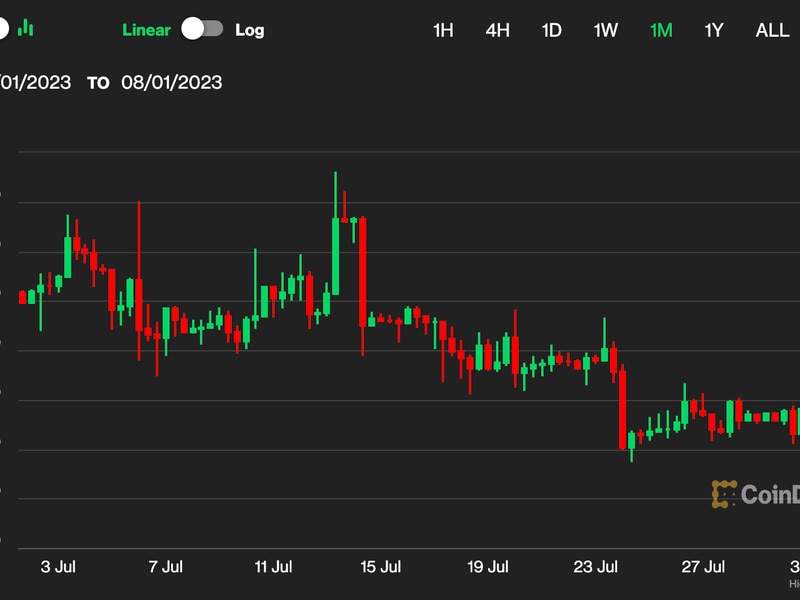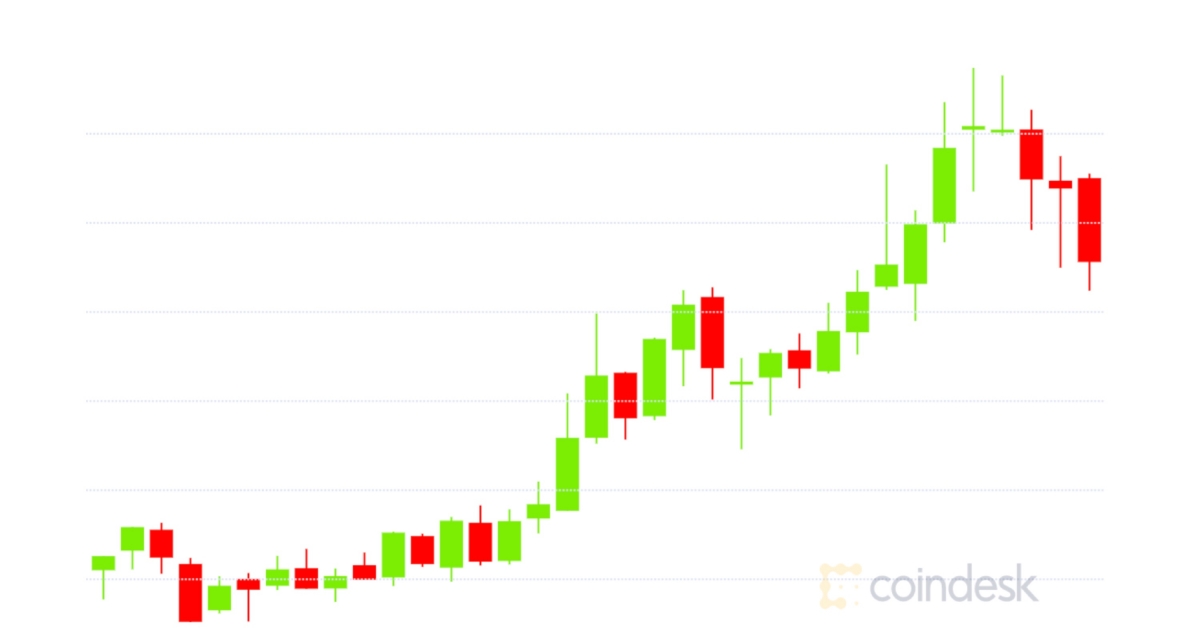First Mover Asia: Bitcoin Holding Pattern Continues as Lawmakers Make Progress in Debt Limit Negotiations
Good morning. Here’s what’s happening:
Prices: Bitcoin hovered near $26.5K for much of Thursday as investors shrugged over unexpectedly strong jobs and productivity data.
Insights: Nvidia GPUs were useful in AI because they can process large amounts of data. Now, they seem key to the company’s growth because they are also well-suited for artificial intelligence (AI) technology.
Bitcoin’s Debt Limit Holding Pattern
Will the U.S. be able to pay its bills after June 1?
The question seemed foremost on the minds of crypto investors who continued to track negotiations about the U.S. debt ceiling. House lawmakers reported progress in the discussions, although whether they and the Biden Administration reach an agreement remains uncertain.
Bitcoin hovered between $26,400 and $26,500 for large swathes of Thursday, a little above where it spent the previous day but below the tight range it held for the previous 12 days in May. The largest crypto by market cap was recently up about 0.5%.
Ether, the second largest crypto in market value, was similarly range-bound, changing hands just above $1,800, up roughly 0.4%.
Other major cryptos were mixed after edging up slightly earlier in the day. The CoinDesk Market Index, a measure of crypto markets performance, was up 0.4%.
“For now, we are stuck in a holding pattern of sorts until we see a resolution to this debt ceiling crisis,” Dave Weisberger, the CEO and co-founder of CoinRoutes, an algorithmic-trading platform for cryptocurrencies.
Crypto markets’ Thursday stasis came even amid the release of unexpectedly positive weekly unemployment figures and GDP – the type of data that has regularly sent markets spiraling. The Labor Department announced that 229,000 Americans filed for unemployment benefits last week, well below the anticipated 245,000, and the U.S. economy increased 1.3%, the third consecutive quarter of growth. Those figures failed to stir equity markets, although a strong forecast by graphics-chip giant Nvidia based on the surging needs of artificial technology seemed to send tech stocks rising as the tech-focused Nasdaq Composite surged 1.7%.
Weisberger, a TradFi vet who worked for Morgan Stanley earlier in his career, sees three possible paths out of the debt ceiling crisis, each with its own outcome for crypto.
-
The Biden Administration halts negotiations to pursue its own actions and spending increases, which would be “wildly bullish for bitcoin in the long run,” Weisberger wrote.
-
A lengthy government shutdown “and/or technical default” sends interest rates spiraling and BTC drops “in the short-term, along with other assets,” but then rebounds. “Bitcoin is an asset that does well when confidence in institutions is low, and such confidence in a default-like scenario would certainly drop further,” he wrote.
-
Or in the most likely result, the U.S. House and administration reach an agreement and “this period of uncertainty and volatility would come to an end,” sending bitcoin higher, albeit only if the U.S. central bank pauses rate hikes.
Weisberger noted the recent lull in trading volumes, though he added that data suggests “that we are in an accumulation phase, where the buyers are relatively passive.”
“Tether-denominated trading for BTC, however, is stronger and the liquidity has grown relative to USD-denominated pairs, suggesting that both volumes and liquidity are higher overseas,” he wrote.
Biggest Gainers
Biggest Losers
Nvidia Has Already Forgotten About Mining
Nvidia’s stock is off like a rocket ship after earnings that were solid, though not fantastic. The graphics-chip company’s stock price closed up 25% on Thursday.
So if the earnings were lukewarm but not spectacular, what’s driving the stock’s growth?
Nvidia’s graphics processing units (GPUs) are useful for AI because they can process large amounts of data in parallel, making them much faster than CPUs for the complex computations needed in machine and deep learning.
Their strength in parallel processing is the same reason why GPUs were useful for proof-of-stake mining. At one time, the price of ether, and the adoption of the ethereum blockchain dictated the price of GPUs, and, likewise, once Ethereum switched to proof-of-stake mining, GPU sales collapsed.
Nvidia was always a bit coy to disclose the amount crypto mining that contributed to the company’s revenue.
In November 2018, as crypto was dealing with a chilly winter thanks to the Initial Coin Offering (ICO) bubble bursting, Nvidia CEO Jensen Huang complained that a “crypto hangover” had caused Nvidia to lose $23 billion in market value.
Then, in May 2022, it paid a $5.5 million fine to the Securities and Exchange Commission (SEC) to settle the affair.
Looking at market research data from firms like Jon Peddie Research (JPR) paints a better picture of the material impact.
In August 2022, as the Merge drew closer, JPR reported overall GPU shipments decreased by 14.9% from the previous quarter. For the fourth quarter of 2022, which JPR says is usually flat, GPU shipments were down 15%. Year-over-year shipments decreased by 38%.
Around the same time, Nvidia’s Crypto Mining Chip revenue – a dedicated processor the company built to preserve the supply of GPUs for its intended market of gamers – began to decline fast and hard.
JPR said that GPUs are expected to have a compound annual growth rate of 0.19% from 2022 to 2026, not exactly the kind of numbers that drive double-digit growth in stocks.
On Nvidia’s latest earnings report, its gaming vertical (where it fits in retail GPU sales) has begun to recover.
But that’s all low-margin, old news for Nvidia now. Its eyes are set on AI. And it doesn’t have to be coy about it with investors.
In case you missed it, here is the most recent episode of “First Mover” on CoinDesk TV:
Terraform Labs co-founder Do Kwon will remain in detention while he faces charges of falsifying official documents, according to a court statement. Separately, bitcoin (BTC) fell toward $26,000 as Treasury Secretary Janet Yellen issued a new warning about the debt ceiling deadline. Nauman Sheikh from Wave Digital Assets shared his crypto markets analysis. Plus, Ripple President Monica Long discussed the blockchain company’s ongoing legal battle against the U.S. Securities and Exchange Commission (SEC). And, Canvas CEO David Lavecky shared an update on central bank digital currency (CBDC) testing in Australia.
Blend Seizes 82% of NFT Lending Market Share, Per DappRadar: Since NFT lending marketplace Blend launched on May 1, it has amassed 169,900 ETH, or about $308 million in volume.
Ex-Sushi CTO Led NFT Lending Platform Astaria Rolls Out to Public: After months in beta, the NFT lending platform has witnessed the highs and lows of its competitors in the space and aims to boost NFT market liquidity while protecting the interests of lenders and borrowers.
Binance Launching NFT Loan Feature: The tool, launching on Friday, will initially support Ethereum loans and NFTs from Bored Ape Yacht Club, Mutant Ape Yacht Club, Azuki and Doodles collections.
Sam Altman’s Crypto Project Worldcoin Raises $115M, Led By Blockchain Capital: Other investors in the Series C round included a16z, Bain Capital Crypto and Distributed Global.
Bitcoin’s Hot Ordinals Economy is Getting a Dollar-Backed Stablecoin: Bitcoin’s quickly maturing ordinals scene has come a long way since January.
Edited by James Rubin.









